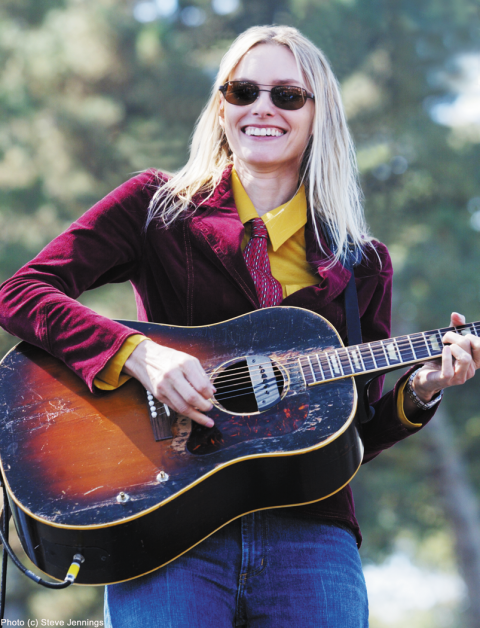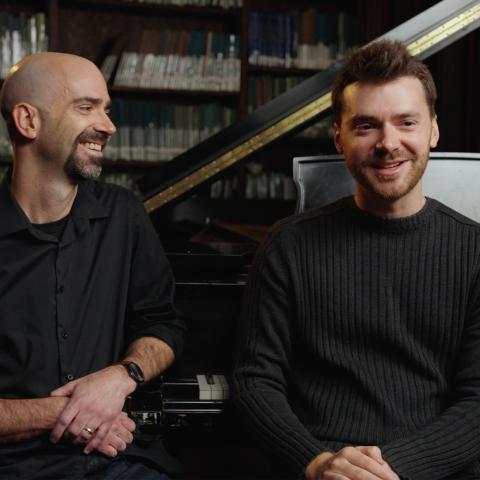Aimee Mann: In a Good Place

Aimee Mann '80
Aimee Mann’s legions of fans know her as a gifted singer, guitarist, and tunesmith whose lyrics frequently explore the darker corridors of the human psyche. Sometimes she takes aim at her song’s antagonist as in “It Takes All Kinds” from her 1999 CD Bachelor No. 2:
As we were speaking of the devil
you walked right in
wearing hubris like a medal
you revel in
but it’s me at whom you’ll level
your javelin.
Yet in other songs, such as “Humpty Dumpty,” the lead-off track from Mann’s latest CD Lost in Space, the song’s narrator portrays herself as someone quite vulnerable:
Baby, you’re great,
you’ve been more than patient
Saying it’s not a catastrophe
But I’m not the girl you once put your faith in
Just someone who looks like me.
Whether her confessional lyrics are informed by events from Mann’s own life, the lives of others, or neither, is known for sure only by Mann. What is known is that in her professional life, she has been vulnerable to the slings and arrows of the record industry. On the flip side, she has proven herself to be a formidable adversary who doesn’t shrink from conflict. The David and Goliath–like battles between Mann and her foes at her former record labels (Epic, Geffen, Imago, and Interscope) raged over artistic control. Others might have decided to adjust their dreams and find a new line of work, but not Mann. The struggles reveal her to be an artist with a rare and deep conviction to her art. She spent a decade wriggling free from unworkable contracts, wrestling to gain ownership of her masters, and then went after Universal for releasing old demos without her okay. These days, Mann is calling all the shots, making music on her own terms, and releasing it on her own SuperEgo Records label.
Mann’s entry to the music business came when she began playing with various groups in Boston’s early 1980s punk scene. In 1983 she formed the band ’Til Tuesday with drummer Michael Hausman ’80, who now is her manager. After gaining the attention of the local radio station WBCN-FM, ’Til Tuesday built enough momentum to get signed by Epic Records. Their debut album, Voices Carry, connected with listeners, and the title track went to number eight on the Billboard Hot 100 charts. Having a hit song and a video in heavy rotation on MTV ratcheted up the pressure for their next two albums. It was clear by the time the third album (Everything’s Different Now) was finished, that Epic’s vision of the band’s artistic direction clashed with Mann’s. Epic gave the record little support, and Mann struggled for four years to get out of a seven-album contract with Epic.
Gaining her freedom, she released her first solo effort, Whatever, on the Imago imprint to rave reviews in 1993. After completing her second solo record, I’m with Stupid, the label collapsed and Mann was in limbo. Imago execs sold her contract to Geffen Records. After living with the record for months, the label decided Mann should go back into the studio to come up with a single. To Mann, the suggestion was ludicrous. While Mann never gave Geffen their single, awareness of the disc expanded nonetheless when three of its cuts were placed in television and movie soundtracks (“That’s Just What You Are” in Melrose Place, “Amateur” in Sliding Doors, and “You Could Make a Killing” in Cruel Intentions).
After Geffen was absorbed by Universal, Mann found herself assigned to the Interscope label. In 1998 she completed her third solo album, Bachelor No. 2; but Interscope, like Mann’s previous labels, wanted a more “commercial” product. Caught in a stalemate, Mann refused to make any changes and Interscope refused to release the disc. The label offered to let Mann out of her contract, an opportunity that Mann eagerly seized, but the album was still the property of Interscope. In 1999, another stroke of good fortune arrived in the form of a collaboration with movie director Paul Thomas Anderson, who based his film Magnolia on eight of Mann’s songs. The success of the movie and the soundtrack (Mann’s song “Save Me” was nominated for an Academy Award) gave Mann the cash to buy back the masters to Bachelor No. 2 and release it herself.
Finally free from major-label fetters, Mann sold the CD through her website (www.aimeemann.com), Amazon.com, and at gigs. Her manager, Michael Hausman, secured distribution arrangements that placed Mann’s independently released music in retail stores. Ultimately getting the last laugh, Mann has seen sales of Bachelor No. 2 top 200,000, which is a huge success for an independent artist. Last year, Mann released Lost in Space, and she has spent the past several months touring the United States and Europe to enthusiastic crowds.
While becoming an independent artist for the first time in her career is very liberating, it doesn’t automatically place Mann on easy street. She bankrolls her own recordings now and, together with Hausman, is in charge of marketing. Mann and Hausman took the unusual step of posting all tracks from Lost in Space on www.aimeemann.com. Yes, some aspects of her career are more difficult without major label clout (obtaining airplay on larger stations for instance); but for Mann and Hausman, the benefits of being independent outweigh the liabilities. Knowing that the records honestly represent her and that every effort expended builds her career, the extra work has been worthwhile and rewarding.
At 12 you picked up the guitar. How soon afterward did you begin writing songs?
It was a couple of years later. Like most people who play guitar, I tried to write songs just to see if I could. It was pretty random. I didn’t know much about chord progressions back then, and when the things that I came up with didn’t sound that good, I couldn’t figure out why.
Did you come to Berklee right after high school?
Yeah. I didn’t know what else to do. I was interested in music but I wasn’t one of those people with a really good ear. I wasn’t learning Beatles songs from the records like a lot of other people I know were. Back then, I thought that having a talent for music was a magic thing that you either had or you didn’t. It hadn’t occurred to me that you could practice and learn, and your ear would become better and your abilities would grow commensurate with the amount of work you put in.
I had heard of Berklee, so I came to the summer program. I did really well and saw that you could improve. I enrolled as a voice major, but it really didn’t take with me. I started taking bass lessons as a beginner.
Do any faculty members stand out in your mind as having been particularly helpful to you?
My bass teacher, Rich Appleman, was great. Berklee was a very jazz-oriented school at that time and there was a bit of jazz snobbery. I was someone who couldn’t play at all when I came to him. But he was totally cool with that and just said, “Okay, let’s get started.” Berklee was a godsend for me, because to go to other music schools like Juilliard you already had to be an accomplished musician. If that had been my only option, I never would have become a musician. I really needed to learn about music theory, take lessons, and be in an atmosphere that would help me to concentrate. I decided I would continue going to Berklee until I felt that I wasn’t learning anything. The fact that I kept learning more and becoming more accomplished was very encouraging.
Did you meet Michael Hausman at Berklee?
No, we actually met in the Boston music scene. He was playing with a band called the Dark, and I was with the Young Snakes. It is amazing, though, how many people I meet who went to Berklee. My current bass player [Paul Bryan ’90], my drummer [John Sands ’78], and my guitar player [Julian Coryell ’92], all went to Berklee.
It must have been a very exciting time back in 1985 when ’Til Tuesday started clicking with MTV and radio. How did you originally get signed to Epic?
I’m not really sure. I’ve heard a couple of stories, because once you get signed and have some success, people start telling you how you really got signed and take credit for it. As I recall, we had been playing the circuit around New England and worked really hard. I think at that time Boston was sort of ready to have a local act do really well. We just seemed to fit into what was going on at the time—eighties pop-dance music. We played in one of the WBCN rumbles and got some attention. Back then, WBCN and Kiss 108-FM used to put local music on the air. They played our demos, so we were getting airplay locally. Lennie Pizzi’s daughter heard one of our songs on the radio and told her father that he should sign us.
The era when radio stations would play an unknown band’s demos seems to be over now.
Now your options for radio are college stations or Clear Channel.
Do you now see the difficulties you had with the big record labels as a two-edged sword now? If you hadn’t gotten the kind of exposure that MTV and radio hits brought you, do you think you could have gotten to this point, where you can create your own music just as you want it and bring in the audiences to your concerts as you do?
I think it is impossible to know. ’Til Tuesday had one hit single that was in the top 10 for a week and a gold record, but it was not like having a platinum record. We got some exposure, but I think that actually got in my way later. People couldn’t get rid of the idea that I was a commercial artist even though the music wasn’t as commercial as they wanted it to be. They had seen me on MTV and had this persistent notion that I was a top-40 artist. That caused a lot of clashes.
I went to various labels to get signed and play them my finished record, and they would have this expectation that I was going to change it after the fact and make it more commercial. I think the ’Til Tuesday experience contributed to that problem.
Do you feel that your connections to Hollywood and your movie soundtrack work have helped to boost your career?
I didn’t really have connections to Hollywood. Paul Thomas Anderson [movie director] had met Michael [Michael Penn, Aimee’s husband] and asked him to score his first movie. We didn’t think Paul would turn into a big Hollywood director who got a lot of attention.
It seems like Paul Thomas Anderson’s film Magnolia helped you a lot.
I think it introduced me to a whole new audience. The Magnolia soundtrack was on Warner Bros. and was getting a cross-promotion from the movie studio too. That’s what did it. Getting support from the record label wasn’t something I was used to. It positioned me in people’s minds, and I was taken more seriously. If you are a singer/songwriter who doesn’t sell a lot of records, it’s easy for people to think that it’s because you aren’t very good rather than circumstances beyond your control like marketing and label support that are the problem.
Knowing what record labels have to do these days to get a song onto radio playlists, do you think it’s a long shot that one of your songs could get serious airplay, and is that something you even desire at this point?
The idea of getting airplay is barely on my radar. I don’t know what airplay will be like now since Clear Channel says they are not going to use indie label material anymore. Clear Channel owns so many stations, and they all have the same playlists. It is beyond just being corporate; they are like the McDonald’s of music. I don’t belong in that world, so serious airplay is something that seems out of the question now.
Now that you operate your own label, has the Internet become a crucial part of your business plan?
I think the Internet helps. We have a publicist and we get a fair amount of press. Touring is still a major part of the promotion for any record. I’m not turning a big profit from touring at this point. I’m happy to break even after paying my musicians and giving them a little bonus at the end of the tour. We work at retail and try to get the record positioned. We did a video and we try to get that played at whatever outlets we can.
Have your record sales been affected by fans posting your songs as MP3s on the Web so that others can download them for free?
I’m sure they have been affected, but it is hard to pinpoint for sure. Record sales are down 20 to 30 percent overall. That affects me too.
Let’s talk about your music. I love the song “Invisible Ink.” The string arrangement, your acoustic guitar finger picked in the beginning and later strummed as the drums come in at the bridge, gives it all the drama of the classic pop and rock songs by Paul Simon, James Taylor, and the Beatles. Do you have roots in that music?
A lot of our influences seem to come from 1960s and early-1970s-pop music. I cowrote “Invisible Ink” about a decade ago with a singer/songwriter from Boston named Clayton Scobel. I had written some lyrics for it but never finished it because it needed a bridge. When I started writing for Lost in Space, I took it out and wrote a bridge and finished it off. The chords and melody to the verse and chorus are probably Clayton’s. I might have changed them a little. Jonathon Quarmby, who is British and lives in London, wrote the string arrangement. We had a system where he would demo up his ideas and send them to me as MP3s. He did a great job. There is an obvious influence for that song in the chorus/bridge section with the slide guitar lines. That is clearly influenced by Todd Rundgren.
The production elements you use to build your songs—the acoustic guitar foundation and the vintage-rock keyboard sounds of Wurlitzer electric piano and Mellotron juxtaposed with lots of electric guitars—seem to say that you have drawn from a number of earlier pop and rock artists to come up with your own unique style.
Well, a Beatles’ influence, as filtered through Badfinger, is in there. There was a Badfinger song called “Name of the Game” from which I took production elements for the song “Humpty Dumpty” on the Lost in Space CD.
You choose classic as well as out-of-the norm grooves for your songs. There are waltzes like “Amateur” and “Nothing Is Good Enough” alongside grooves for “Driving Sideways,” which has a 12/8 feel with triplets on the ride cymbal. What contributes to your choices?
I am really attracted to things in 3/4 or 6/8. Sometimes I consciously have to tear myself away from 3/4.
Some of your chord progressions go beyond the traditional rock chord vocabulary. I’m thinking of one song in particular, “Guys Like Me,” that uses a minor-seven-flat-five chord throughout. How did you come to that choice?
I didn’t think about it too much; it was probably a chord shape on the guitar that I learned from having played Harry Nilsson’s song “One.” These things generally come from just arbitrarily choosing a chord and seeing if my ear can put a melody over it.
On many songs, you sing in a very low part of your vocal range. That lends a close-up, intimate effect to songs such as “The Moth.” Can you talk about that?
Most people choose a key to sing in based on what they do live. I do it the other way around, which can be a problem sometimes. To sing a song in the studio when you are using a beautiful mic and it is loud in your headphones is a totally different experience from singing the song onstage. Songs like “The Moth” and “Invisible Ink” are so low that it’s actually hard to sing them live.
You have a large catalog of songs now. When you write material for a new album, do you become more attached to the new songs so that the older ones fade into the background?
Well, I still feel pretty attached to the songs on my second solo record, but not so much to the ones on the first one. The rest of my songs feel like they are pretty recent to me. I still play “4th of July” from the Whatever album a lot. I also get a lot of requests for “The Other End of the Telescope,” which came from the third ’Til Tuesday record.
In your live shows, you have been covering the Lynyrd Skynyrd tune “Sweet Home Alabama.” How did that song get into the lineup?
For encores, we always ask the audience for requests and there is always someone in the crowd who yells out “Play ‘Free Bird.’” I wanted to learn the song and play it for the next jackass who asked for it. We started listening to some Lynyrd Skynyrd albums and decided “Free Bird” is all right, but “Sweet Home Alabama” was what it was all about. We started playing it at sound check. It is a simple, three-chord song, but the nuances in Skynyrd’s arrangement are fantastic and you kind of have to learn every one of them to do the song well. The great thing about working with Julian Coryell is that he learned every guitar lick. So we ended up with a note-for-note version of the song.
What would be the best possible next thing for your career?
More of the same. I don’t have any extraordinary plans. I’d like to get more of my songs into TV shows and movies. That is always a helpful way to get people to hear the music, and it pays pretty well. If you own your masters, you will get the full payment—you won’t have to give most of it away to a record company.
What would you tell a young singer/songwriter trying to launch a career in the current music industry climate?
I don’t really know. I guess the only thing that I could tell them is to be great. To reach the level we are at is hard. I am coasting with a reasonably high profile and have an audience already built up. For independent artists at a small label with a few employees, I wouldn’t know what to tell them about marketing their record in a big way. The best advice you can give anyone is an old cliché: if you are not doing this because you love it, then forget it. Loving it will get you through having to deal with a lot of annoying people and experiencing a lot of disappointment. If you are really good, you can find an audience. There are a lot of people out there seeking artists who really care about songwriting and lyrics. There are millions of artists, but there are not a lot of people who can really write a good song.
What do you tell journalists who ask if the angst will go missing from your songs now that you have your own label and are married?
[Laughs] If only the angst would go missing from my life!




